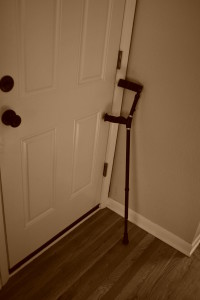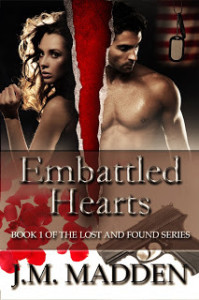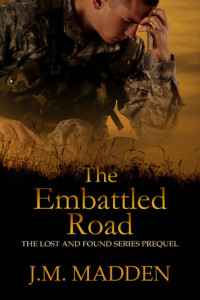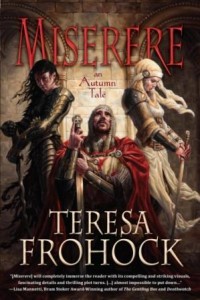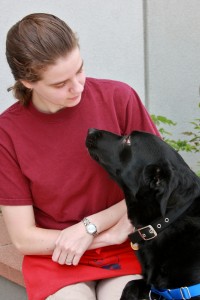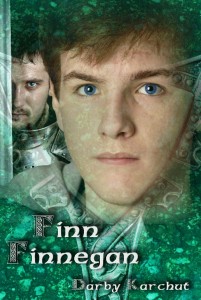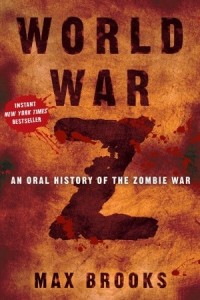In the spirit of the holiday I have a special post for y'all. This is a short story I wrote back in September as a response to a prompt that said "write something that takes place in a public restroom". I'm not sure how a romance fell out but it did. I think it could use a couple more drafts but the foundation is there. I hope y'all enjoy, and happy valentine's day.
The door of the restroom swung open. A young woman limped in, her flats shuffling across the tiles and her crutch clicking with each uneven step. She stopped and leaned against the cool wall, looked down at the bridesmaid's dress she wore, and burst into tears.
She should never have introduced them. Kara sniffled and reached into her purse to grab some more tissues. The wads in her fist which she'd been using all night were too soggy with tears and snot to do her any good now. Her fingers found some loose change, a tube of chapstick, and four pens, but no Kleenex.
Dammit. Her nose was leaking like that stupid kitchen faucet she still hadn't fixed. She ducked down to make sure the stalls were empty and limped across to the counter. She winced when she saw her blotchy face reflected in the mirror. That shade of red definitely clashed with the coral of her dress. She turned from the horrifying visage and propped her crutch against the counter so she could snatch up a few paper towels.
Really, this was her fault. She shouldn't have introduced them, she thought again. Or at least she should have refused the dubious honor of standing next to them as they tied the knot. Then she wouldn't have had to come at all and wouldn't have had to watch her best friend marry the only guy who had ever looked past Kara's crutch to see her.
Kara froze as the door to the reception hall swung open, letting in a burst of sound from the party. Oh God, if it was Emily, she'd just go ahead and die on the spot, public restroom or not.
But it wasn't Emily. Her gaze met startled gray eyes in a distinctly masculine face.
Kara squeaked and darted into the back stall, but her drooping foot caught the edge of a tile and she stumbled. Ready to start crying again, this time with frustration, she slammed the door shut and collapsed onto the toilet.
“Oh crap, I'm sorry.” His voice came over the stall door.
“What are you doing in the women's restroom?” she said. Her voice sounded too high, and she concentrated on bringing it back into a register discernible to humans.
“I didn't notice the sign,” he said.
“It's a chick in a dress. How could you not see it?”
“I just didn't.” He paused. “Are you okay?”
She blew out her breath. “I'm fine. Go away.”
“Your face is all red.”
“Gee thanks.”
He didn't apologize but there was an awkward silence where it kind of felt like he wanted to. “I have a confession,” he finally said. “I didn't come in here by accident.”
“You didn't,” Kara said, her voice flat.
“No.”
There was another pause. This one went on a bit longer. “Are you still there?” he said.
“I'm trying to decide if you're some creepy pervert.”
He laughed. She liked the sound of it ringing off the walls of the restroom. “Not a creepy pervert,” he said. “I swear.” She imagined him holding up his hand as if swearing on a Bible. “I'm Paul. Emily's brother.”
That's right. She'd met him last night at the dress rehearsal, but she'd been so worried about not being bitter and not ruining Emily's wedding that all she remembered of him was a brief impression of light eyes and dark hair. But wait, if he was her brother...
Kara groaned. “Emily sent you in here, didn't she?”
“Yeah.” He sounded kind of resentful and weary at the same time. Guess he didn't like being sent to comfort the third wheel any more than she liked being recognized as the third wheel.
“Well, you can tell her I'm fine. I'm not angry, or upset, or-or anything, all right?”
She heard him shift and it sounded like he was leaning against the counter. “I don't think she expected you to be in here crying,” he said.
“Why else would she send you?”
“Maybe because she thought you could help me.” His voice was quiet.
Kara closed her eyes and pounded her forehead with her fist. Not everything's about you, stupid. Well, maybe if she helped him with whatever problem he had, he would go away and leave her alone. “Why do you need my help?” she said.
“I don't.” His response was too quick and too loud. “I'm fine. Emily's just overprotective, and she thought since we both have disabilities... you know, instant connection.”
Kara sighed. “Why does everyone think that crippled people are automatically attracted to other crippled people?”
“I don't know. It's insulting really.”
“It is.” Kara narrowed her eyes and thought back. She didn't have a great memory of him from the night before, but she knew she would have noticed if he'd been in a wheelchair or had crutches like hers. “Wait,” she said. “I don't remember you having a disability.”
“You're assuming you can see it.”
“So, you mean like vertigo?”
“I mean like PTSD.”
“Oh. Were you in the military?”
“Nothing so heroic,” he said. “I was a hostage in that bank robbery last year.”
“The one on 6th street? Geez, I remember that.”
“Yeah, nothing like being in combat or anything, but it kind of messed me up.”
She was getting better at reading his voice. He sounded embarrassed with something deeper underneath. Shame? “Paul, they kept those hostages locked up in that safe for three nights. And a couple people were shot, weren't they.”
She heard him swallow. “Yeah.”
“I'm not trying to remind you or anything, I'm just saying, that would mess anyone up.”
“Yeah, well, I'm better now I've got Warden. He keeps me sane. I'm usually too worried about him sticking his nose up women's skirts to be worried about myself.”
“Who is Warden and why hasn't he been arrested?” she asked.
“He's my service dog. And most of the girls forgive him once he looks up at them with those big brown eyes.”
“You have a service dog? Why didn't you bring him?”
He paused. “I did.”
She leaned over and looked under the stalls and saw Paul's feet in his dress shoes. Right next to him were four paws and the tip of a wagging tail.
“Sorry, I didn't see him.”
“He's big and slobbery and wears a bright red vest. How could you miss him?”
She heard the smile in his voice and couldn't help smiling in return. “I just did. Besides you startled me.”
“Yeah, sorry about that. So why are you in here instead of out there eating cake?”
Her smile disappeared at the reminder. “I'm being pathetic,” she said, going for a light-hearted tone. “I didn't want to ruin Emily's wedding by bursting into tears during their first dance.”
“You don't approve of the groom?”
“Oh no. I know he's a really great guy. That's the problem.”
“So you're in love with him,” Paul said.
“No.” The stall door made the perfect barrier to hide behind, so she found it easier to say, “I just thought he might be the kind of person who could love me. And those are hard to find.”
“Well, now it just sounds like you're fishing for compliments.”
Kara knew he was trying to lighten her mood, but she'd had a rough couple days and just wanted a moment of self-indulgence. “Oh, that's what it sounds like to you? Well, that's the reality I live with. Every guy I meet I have to wonder if he's going to be one of the ones who only sees my disability. Half of them have a hero complex and the other half get that glazed look right before they run away because I'd be too much work.”
“At least you can leave your house without having some kind of breakdown. Every day I wonder if I'll actually be able to step out the door. At every store I have an argument with myself about whether there are enough exits or too many people inside.”
“But no one knows what's going on in your head,” Kara said. “You can smile and nod at people and they won't be able to tell you have problems. I get judged before I even open my mouth. Everyone can see my weakness as I step out of a car or stand up from a chair.”
“And that's a bad thing? Do you know how long it took me to realize that I actually had a serious condition? This is something treatable, but only if you recognize that it's there. Once I finally acknowledged that I needed help, I had to convince the rest of the world there really was something wrong with me and it wasn't all in my head. You don't have to convince anyone.”
Suddenly, Kara was laughing, the tension and the anger spilling out until she felt loose and free. “Are we arguing about who's disability is more disabling?” she said.
His chuckle was warm. “I guess so. Is it weird that I kind of feel better?”
“Not really. I feel better, too. Maybe Emily knew what she was doing.”
He was quiet while she fished in the toilet paper dispenser for something to wipe her nose. The plastic rattled.
“Drat,” she said.
“What?”
“It's empty, and I'm out of tissues.”
A package sailed over the stall door, and she reached up to grab it just to keep it from hitting her in the face. It was one of those pocket size packets of Kleenex.
“Really?” she said, her breath huffing out on a laugh.
“Brother of the bride, you know. I have another confession,” he said. “Emily might have asked me to talk to you, but that's not why I came in here. I've been trying to get up the nerve to ask you to dance all night.”
“So you followed me into the bathroom?”
“I didn't want to lose my chance. I guess I got a little carried away when I realized you were alone and no one would overhear my awkward attempt to ask you out to dinner tomorrow.”
“First it was just a dance, now you want a date too?”
“I wanted a dance cause you're pretty. I want a date because you're interesting and I'm really enjoying our conversation.”
“Hmm. Are you sure you're not one of those guys that only sees the disability.”
“I don't know. It's hard to tell since I haven't actually seen you in a while. Why don't you come out and you can judge?”
“My face might still be splotchy.”
“Warden doesn't mind, do you? He says he doesn't.”
Kara suppressed a giggle and levered herself to her feet. She took a moment to smooth her dress and make sure her mascara hadn't run before she opened the stall door and stepped outside. Paul leaned against the counter, his lips curving up in a smile, a German shepherd grinning at his feet.
“Well?” she said. She turned like a model on a runway, hanging onto the stalls for support. Where had she left her crutch?
He shook his head. “No disabilities. I just see a beautiful woman.” He cocked his head. “Is there hope for me?”
Kara pretended to consider. “What do you think, Warden?”
The dog's tail thumped against the tiles.
“I agree.” She spotted her crutch propped on the counter opposite Paul, and she limped to grab it. Something cold and wet touched the back of her knee, and she felt the back of her skirt lift. She jumped, slipped, and caught herself against the counter with her hand in the sink.
“Warden! Sorry, sorry.” Paul was yanking the shepherd's harness.
Kara laughed. “I suppose you did warn me.”
“What did you agree with?” he asked the dog and then looked up at Kara. “Do I get a dance and a date?”
Kara opened her mouth just as the door opened and an older woman wearing a burnt orange sweater and a lime green skirt swarmed into the restroom.
Paul started guiltily when her eyes widened and she stopped short.
“Paul Jay Sherman. What do you think you're doing in the ladies room?”
“Aunt Phyllis. I was just-”
“You were just leaving, is what. Stop bothering this young woman and get marching.” She pointed to the door, and Kara had to cover her smile.
Warden stepped in front of Paul and leaned against his legs. Paul seemed to soak in the dog's strength and stood up straighter. “Not until I've heard her answer.” He turned to her and held out his hand. “So, what will it be Kara?”
His eyes stayed locked on hers. They didn't stray toward her crutch or her legs.
She placed her hand in his. “A dance then,” she said.
“And dinner?”
She smiled. “And dinner.”
They walked out of the women's restroom, letting Aunt Phyllis seek out a stall in peace.
The restroom door swung open. A young woman limped in, the clicking of her crutch muffled by the fabric of her wedding dress. She stopped by the mirror and took a moment to check her makeup. Out of the corner of her eye she saw a plastic package of Kleenex propped up by the sink. She smiled as she reached for it.
“Kara?” A girl poked her head around the door. “Paul says hurry. Emily's about to start her toast, and he says he can't live through it without moral support.”
Kara curled her fingers around the tissues. “I'm coming,” she said.
“Okay. Oh geez! Warden, no.”
Kara laughed and left the restroom.
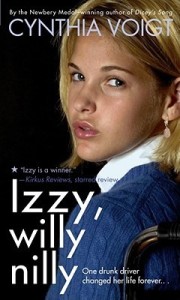 Izzy, willy-nilly by Cynthia Voigt
When Izzy loses her leg in a car accident with a drunk driver, she feels like she’s lost her whole life. Her friends can’t relate to her, and her family doesn’t understand what she’s going through. But when another outcast reaches out in friendship, Izzy learns that, despite everything, she hasn’t lost herself.
Izzy, willy-nilly by Cynthia Voigt
When Izzy loses her leg in a car accident with a drunk driver, she feels like she’s lost her whole life. Her friends can’t relate to her, and her family doesn’t understand what she’s going through. But when another outcast reaches out in friendship, Izzy learns that, despite everything, she hasn’t lost herself.
